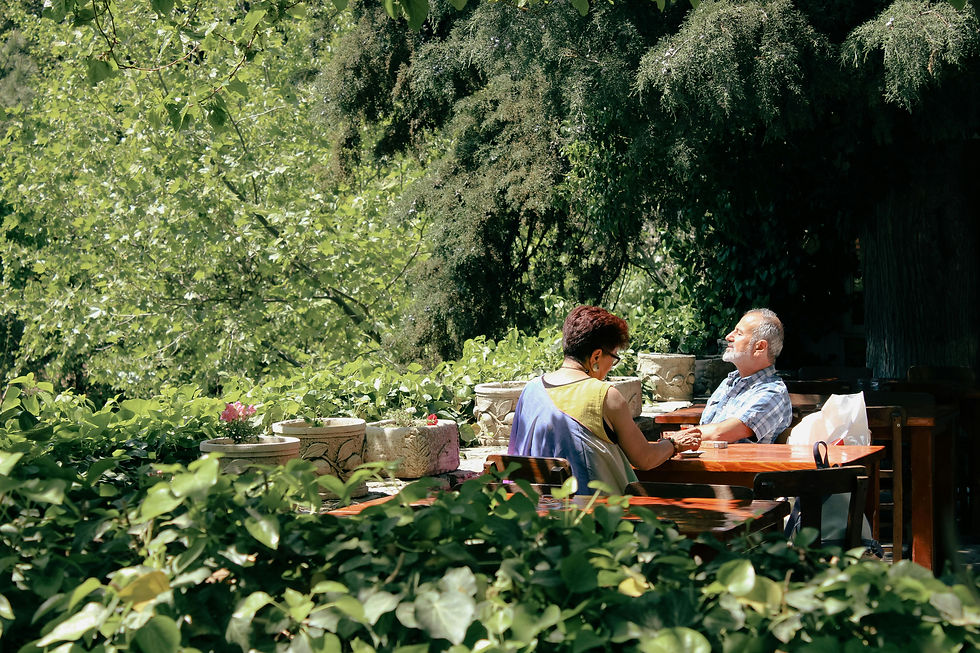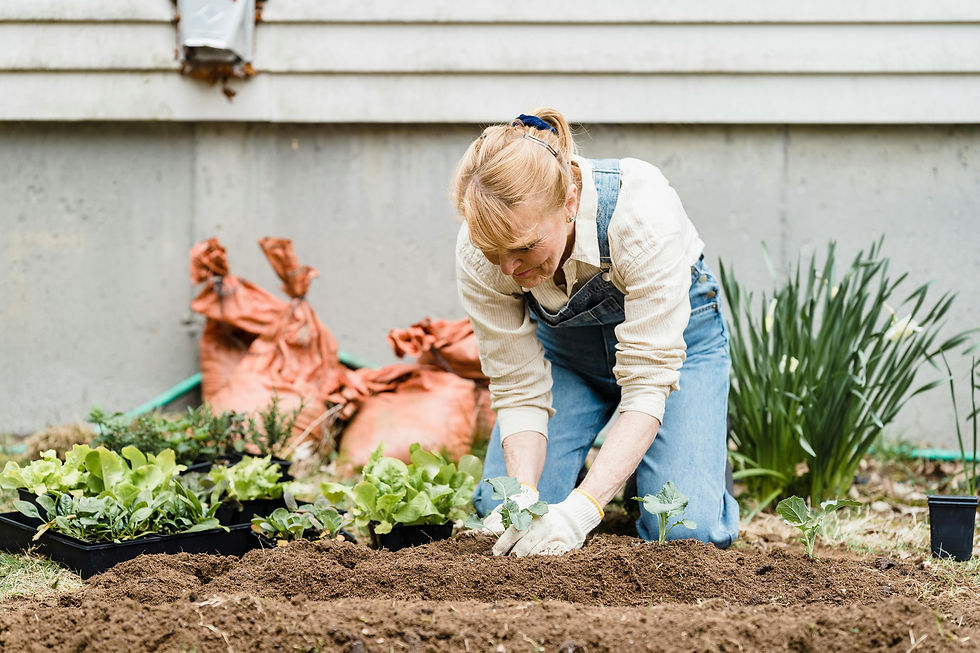The Green Prescription: Exploring the Therapeutic Effects of Nature on Senior Health
- Christian Companions

- Apr 3, 2024
- 5 min read

With the advent of spring, here at Christian Companions Houston we thought we might remind our readers of the myriad of benefits that nature can offer our beloved seniors.
As we navigate the journey of aging, our connection to the natural world takes on profound importance. The great outdoors, with the soothing sights and sounds of leaves rustling in the wind, the chip chirp of hidden birds, the smell of dewy grass and the fragrance of flowers all work to excite our senses and they rejuvenate the mind, body, and spirit.
For our elders, engaging in nature's embrace can unlock a wealth of benefits that enhance mental well-being, combat loneliness, and foster a renewed zest for life.
Through this article, we’ll dive into the remarkable ways in which nature positively impacts senior mental health, uncovering the latest research and insights that emphasize the vital role of outdoor experiences in cultivating resilience, cognitive vitality, and emotional equilibrium during a senior’s golden years.
Boost Senior Mental Wellness with Nature: Exploring the Benefits
The profound impact of nature on senior mental health manifests itself in many ways, as evidenced by a growing body of research. From bolstering cognitive abilities and alleviating psychological distress, to combating depression, anxiety, and social isolation, exposure to natural environments emerges as a potent catalyst for improved mental well-being among our elderly population.
Cognitive Function and Psychological Health
A 24-session therapeutic horticulture program in Singapore highlighted not only improvements in cognitive functioning but also in psychological health, demonstrating a reduction in anxiety and maintenance of healthy sleep patterns among older adults.
Similarly, exposure to nature has been directly linked to enhanced brain activity and cognitive function, alongside notable improvements in mental health.

Deterring Depression and Anxiety
The practice of forest bathing, originating from Japan, showcases significant mental health benefits, including the reduction of depression and anxiety levels. This goes hand in hand with the finding that regular physical activity in natural settings can lower the risk of mental health problems and early death.
Moreover, spending time outdoors, particularly when combined with exercise, has been proven to decrease anxiety and improve mood.
Social Connections and Loneliness
Nature fosters social connections, which are crucial for mental health. Activities in green spaces not only reduce feelings of isolation but also promote a sense of community among seniors. This is supported by evidence showing that leisure-service providers facilitating nature-based activities can lead to richer and more meaningful lives for the elderly.
Additionally, the presence of nature in urban areas can significantly diminish feelings of loneliness by enhancing attachment to place and providing more opportunities for socializing.
Exploring the Link: Outdoor Activities and Physical Health Benefits
While the positive impacts of nature on mental well-being are well-documented, the great outdoors also offers a variety of physical health advantages for our senior population.
Engaging in outdoor pursuits can aid with invigorating the body and fortifying its defenses against the ravages of age and chronic illness.
From strengthening cardiovascular resilience and promoting muscular flexibility, to boosting immunity and joint health, immersing oneself in nature's embrace can unlock a multitude of rejuvenating effects.

Cardiovascular and Muscular Health
Regular outdoor activities such as brisk walking, gardening, and yoga improve cardiovascular health, maintain flexibility, and alleviate joint pain.
Utilizing outdoor fitness equipment can combat vitamin D deficiency, contribute to healthy weight management, and improve cardiovascular fitness.
Walking just under two hours per week can lower the risk of death, improve life expectancy, and reduce the risk of obesity, type 2 diabetes, cardiovascular disease, and mental illness.
Immune System and Chronic Conditions
By simply spending time outdoors, breathing in the invigorating essence of the natural world, elders can tap into an innate, revitalizing force that primes their immune function for optimal protection.
The fresh air, rich with phytoncides – antimicrobial compounds emitted by plants – can stimulate an increase in the production of white blood cells and natural killer cells, fortifying the immune system's army against viruses and inflammation. This rejuvenating effect harnesses nature's own healing compounds, equipping seniors with enhanced resilience to combat infections and maintain robust health as they navigate their golden years.
Bone and Joint Health
Stepping into the great outdoors unlocks a wealth of benefits for senior bone and joint health. Exposure to natural sunlight allows the body to produce vitamin D, a crucial nutrient for calcium absorption and maintenance of strong, dense bones that are resistant to osteoporosis and fractures.
Weight-bearing outdoor activities like walking, hiking, or jogging provide an ideal form of exercise to build and preserve bone density while also strengthening the muscles surrounding the joints for improved stability and reduced arthritis pain. For those seeking lower-impact options, the outdoors presents solutions like swimming, cycling, and tai chi that bolster muscle strength and flexibility without excessive joint stress.
Even gardening can be a gentle outdoor pursuit that increases hand strength and range of motion in the joints. By embracing nature's backdrop, seniors can reap a multitude of benefits that promote skeletal integrity, joint health, and overall functional mobility as they age.

Nature's Company: A Remedy for Social Isolation
Engaging with the natural world can be a potent antidote to loneliness, offering a profound sense of connection and belonging that stands in stark contrast to the pressures and norms of society.
This transformative experience can be deepened further by cultivating gratitude towards nature, fostering a reciprocal relationship that enriches the bond between individuals and their surroundings.
Incorporating mindfulness practices amplifies this effect, guiding individuals to immerse themselves fully in the sensory delights of nature, effectively quieting the noise of internal turmoil and overthinking. Additionally, communal experiences in nature serve as catalysts for forging meaningful social connections and nurturing enduring friendships, thereby addressing the root causes of social isolation.

Incorporating Nature into Daily Life for Seniors
Incorporating nature into the daily lives of seniors, especially those with mobility challenges, can often be a struggle that is difficult to overcome. But with the care and attention of a compassionate caregiver, seniors can access the benefits of basking in nature. By providing transportation, medication reminders, and assistance with tasks, caregivers ensure seniors can safely enjoy outdoor activities
For seniors who may not move around easily, enjoying nature doesn't necessarily require extensive travel. Simple pleasures such as sitting on porches or decks to feel the breeze, visiting parks with paved paths, tabletop gardening, and bird watching are accessible ways to connect with the outdoors.

Outdoor Strolls
An in-home caregiver can encourage and facilitate regular outdoor walks with the senior, whether it's in a nearby park, garden, or simply around the neighborhood. This provides the senior with the opportunity to enjoy the sights, sounds, and fresh air of nature while engaging in light physical activity.
Gardening Activities
A caregiver can assist the senior in creating and maintaining a small garden or potted plants indoors. This can involve tasks such as planting seeds, watering plants, and gentle gardening activities. Gardening not only allows the senior to connect with nature but also provides a sense of purpose and accomplishment.
Nature Observation
The caregiver can arrange for the senior to spend time near a window or on a patio where they can observe nature, such as watching birds, squirrels, or other wildlife. Providing binoculars, bird feeders, and art supplies can enhance this experience and encourage the senior to actively engage with and document their natural surroundings.
References
[3] - https://www.psu.edu/news/health-and-human-development/story/time-nature-may-help-older-adults-improved-health-purpose-life/ [4] - https://www.theguardian.com/society/2021/dec/20/contact-with-nature-cities-reduces-loneliness-study-mental-health





Comments